Humans must transition to a more environmentally sustainable diet that includes maggots and fungi to protect the global food supply, researchers concluded in a report.
Global malnutrition can be avoided if humans begin consuming foods such as house fly larvae, fungi proteins and algae like kelp, according to a University of Cambridge Centre for the Study of Existential Risk (CSER) report published in the Nature Food journal on Thursday. The coronavirus pandemic proves the need to plan for future “systemic risk events” including the potential failure of the global food system, the report said.
“In light of the coronavirus pandemic—an exemplar systemic risk event—and our increasing knowledge of structural risks, uncertainties and cascading failures in the global agri-food system, we maintain that a risk-resilient diet is essential to ensure short- and long-term food security,” the report concluded.
“We urge scientists, engineers, investors and policymakers to consider future foods as a malnutrition mitigation pathway,” the report said. (RELATED: COVID-Fueled Economic Slowdown Likely To Starve Millions Of Children, New Study Claims)
Transitioning to such unorthodox foods would allow people, especially those living in poor communities, to produce their food locally and not rely so heavily on the global supply chain, Science Daily reported. The food is also a nutritious alternative to the common plant-based and animal-based diets most people maintain today.

A worker holds bags of mushrooms produced by the company Permafungi in Brussels, Belgium in July 2020. (John Thys/AFP via Getty Images)
“Foods like sugar kelp, flies, mealworm and single-celled algae such as chlorella, have the potential to provide healthy, risk-resilient diets that can address malnutrition around the world,” Dr. Asaf Tzachor, a CSER researcher and author of the report, told Science Daily.
“Our current food system is vulnerable. It’s exposed to a litany of risks – floods and frosts, droughts and dry spells, pathogens and parasites – which marginal improvements in productivity won’t change,” he added. “To future-proof our food supply we need to integrate completely new ways of farming into the current system.”
Modern technology allows for the shift to occur from modern diets to insect and fungi diets, Catherine Richards, another report author and CSER researcher, told Science Daily.
Microalgae, mycoprotein and insect larvae are resilient to global trade restrictions, environmental degradation and pollution, extreme weather events, climate change and pests, according to the report.
The report was based on nearly 500 papers that the authors analyzed, according to Science Daily.
Malnutrition is the most dangerous global public health threat, according to the World Health Organization. More than 3 million children die as a result of malnutrition while millions more suffer lasting damage as a result.
All content created by the Daily Caller News Foundation, an independent and nonpartisan newswire service, is available without charge to any legitimate news publisher that can provide a large audience. All republished articles must include our logo, our reporter’s byline and their DCNF affiliation. For any questions about our guidelines or partnering with us, please contact licensing@dailycallernewsfoundation.org.


